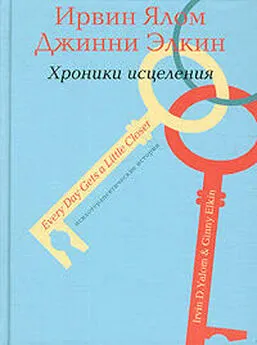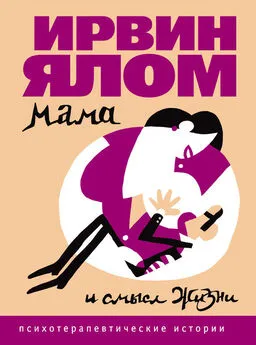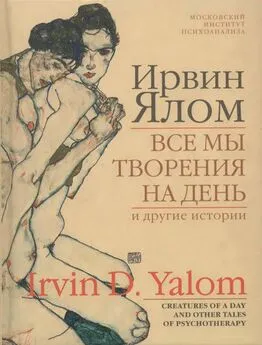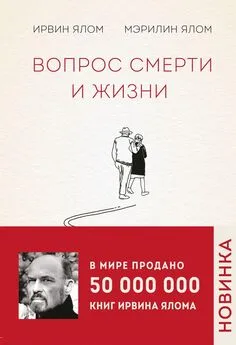Ирвин Ялом - The Schopenhauer Cure
- Название:The Schopenhauer Cure
- Автор:
- Жанр:
- Издательство:неизвестно
- Год:неизвестен
- ISBN:нет данных
- Рейтинг:
- Избранное:Добавить в избранное
-
Отзывы:
-
Ваша оценка:
Ирвин Ялом - The Schopenhauer Cure краткое содержание
The Schopenhauer Cure - читать онлайн бесплатно полную версию (весь текст целиком)
Интервал:
Закладка:
considered the paraphernalia of the most powerful and longest–running con game in
history, a game which empowered the leaders and satisfied the congregation`s lust for
submission.
But now, with death standing next to him, Julius noted that his vehemence had lost
its bite. Maybe it was simplyimposed ritual he disliked. Perhaps a good word could be
found for a little personal creative ceremony. He was touched by the newspaper
descriptions of the firemen at ground zero in New York, stopping, standing, and
removing hats to honor the dead as each pallet of newly discovered remains was brought
to the surface. Nothing wrong with honoring the dead...no, not the dead, but honoring the
life of the one who died. Or was it something more than honoring, more than sanctifying?
Wasn`t the gesture, the ritual of the firemen, also signifying connectivity? The
recognition of their relationship, their unity with each victim?
Julius had a personal taste of connectivity a few days after his fateful meeting with
his dermatologist when he attended his support group of fellow psychotherapists. His
fellow doctors were stunned when Julius revealed the news of his melanoma. After
encouraging him to talk himself out, each group member expressed his shock and sorrow.
Julius couldn`t find any more words, nor could anyone else. A couple of times someone
started to talk but did not, and then it was as if the group agreed nonverbally that words
were not necessary. For the final twenty minutes all sat in silence. Such prolonged
silences in groups are almost invariably awkward, but this one felt different, almost
comforting. Julius was embarrassed to admit, even to himself, that the silence felt
«sacred.» Later it occurred to him that the members not only were expressing grief but
were also removing their hats, standing at attention, joining and honoring his life.
And perhaps this was a way of honoring their own lives, Julius thought. What else
do we have? What else other than this miraculous blessed interval of being and self–awareness? If anything is to be honored and blessed, it should simply be this—the
priceless gift of sheer existence. To live in despair because life is finite or because life
has no higher purpose or embedded design is crass ingratitude. To dream up an
omniscient creator and devote our life to endless genuflection seems pointless. And
wasteful, too: why squander all that love on a phantasm when there seems too little love
to go around on Earth as it is? Better to embrace Spinoza`s and Einstein`s solution:
simply bow one`s head, tip one`s hat to the elegant laws and mystery of nature, and go
about the business of living.
These were not new thoughts for Julius—he had always known of finiteness and
the evanescence of consciousness. But there is knowing andknowing. And death`s
presence on the stage brought him closer to really knowing. It was not that he had grown
wiser: it was only that the removal of distractions—ambition, sexual passion, money,
prestige, applause, popularity—offered a purer vision. Wasn`t such detachment the
Buddha`s truth? Perhaps so, but he preferred the path of the Greeks: everything in
moderation. Too much of life`s show is missed if we never take off our coats and join in
the fun. Why rush to the exit door before closing time?
After a few days, when Julius felt calmer with fewer sweeps of panic, his thoughts turned
to the future. «One good year» Bob King had said, «no guarantees, but it would not be
unreasonable to hope for at least a year of good health.» But how to spend that year? One
thing he resolved was not to make that one good year a bad year by grieving that it was
not more than a year.
One night, unable to sleep and craving some comfort, he restlessly browsed in his
library. He could find nothing written in his own field that seemed even remotely relevant
to his life situation, nothing pertaining to how should one live, or find meaning in one`s
remaining days. But then his eye fell upon a dog–eared copy of Nietzsche`sThus Spake
Zarathustra. Julius knew this book well: decades ago he had thoroughly studied it while
writing an article on the significant but unacknowledged influence of Nietzsche on
Freud.Zarathustra was a brave book which more than any other, Julius thought, teaches
how to revere and celebrate life. Yes, this might be the ticket. Too anxious to read
systematically, he flipped the pages randomly and sampled some of the lines he had
highlighted.
«To change вЂit was` into вЂthus I willed it`—that alone shall I call redemption.»
Julius understood Nietzsche`s words to mean that he had to choose his life—he had
to live it rather than be lived by it. In other words he should love his destiny. And above
all there was Zarathustra`s oft–repeated question whether we would be willing to repeat
the precise life we have lived again and again throughout eternity. A curious thought
experiment—yet, the more he thought about it, the more guidance it provided:
Nietzsche`s message to us was to live life in such a way that we would be willing to
repeat the same life eternally.
He continued flipping the pages and stopped at two passages highlighted heavily in
neon pink: «Consummate your life.» «Die at the right time.»
These hit home. Live your life to the fullest; and then, and only then, die. Don`t
leave any unlived life behind. Julius often likened Nietzsche`s words to a Rorschach
exam; they offered so many opposing viewpoints that the readers` state of mind
determined what they took from them. Now he read with a vastly different state of mind.
The presence of death prompted a different and more enlightened reading: in page after
page, he saw evidence of a pantheistic connectedness not previously appreciated.
However much Zarathustra extolled, even glorified solitude, however much he required
isolation in order to give birth to great thoughts, he was nonetheless committed to loving
and lifting others, to helping others perfect and transcend themselves, to sharing his
ripeness.Sharing his ripeness —that hit home.
ReturningZarathustra to its resting place, Julius sat in the dark staring at the lights
of cars crossing the Golden Gate Bridge and thinking about Nietzsche`s words. After a
few minutes Julius «came to»: he knew exactly what to do and how to spend his final
year.He would live just the way he had lived the previous year—and the year before that
and before that. He loved being a therapist; he loved connecting to others and helping to
bring something to life in them. Maybe his work was sublimation for his lost connection
to his wife; maybe he needed the applause, the affirmation and gratitude of those he
helped. Even so, even if dark motives played their role, he was grateful for his work. God
bless it!
Strolling over to his wall of file cabinets, Julius opened a drawer filled with charts and
audiotaped sessions of patients seen long ago. He stared at the names—each chart a
monument to a poignant human drama that had once played itself out in this very room.
As he surfed through the charts, most of the faces immediately sprang to mind. Others
had faded, but a few paragraphs of notes evoked their faces, too. A few were the truly
forgotten, their faces and stories lost forever.
Like most therapists, Julius found it difficult to seal himself off from the
unremitting attacks on the field of therapy. Assault came from many directions: from
pharmaceutical companies and managed care, which sponsored superficial research
orchestrated to validate the effectiveness of drugs and briefer therapies; from the media,
which never tired of ridiculing therapists; from behaviorists; from motivational speakers;
from the hordes of new age healers and cults all competing for the hearts and minds of
the troubled. And, of course, there were doubts from within: the extraordinary molecular
neurobiological discoveries reported with ever–increasing frequency caused even the
most experienced therapists to wonder about the relevance of their work.
Julius was not immune to these attacks and often entertained doubts about the
effectiveness of his therapy and just as often soothed and reassured himself.Of course he
was an effective healer.Of course he offered something valuable to most, perhaps even
all, of his patients.
Yet the imp of doubt continued to made its presence known:Were you really, truly,
helpful to your patients? Maybe you`ve just learned to pick patients who were going to
improve on their own anyway.
No. Wrong! Wasn`t I the one who always took on great challenges?
Huh, you`ve got your limits! When was the last time you really stretched yourself—
took a flagrant borderline into therapy? Or a seriously impaired schizophrenic or a
bipolar patient?
Continuing to thumb through old charts, Julius was surprised to see how much
posttherapy information he had—from occasional follow–up or «tune–up» visits, from
chance encounters with the patient, or from messages delivered by new patients they had
referred to him. But, still, had he made an enduring difference to them? Maybe his results
were evanescent. Maybe many of his successful patients had relapsed and shielded that
information from him out of sheer charity.
He noted his failures, too—folks, he had always told himself, who were not ready
for his advanced brand of deliverance. Wait, he told himself, give yourself a break,
Julius. How do you know they werereally failures?permanent failures? You never saw
them again. We all know there are plenty of late bloomers out there.
His eye fell upon Philip Slate`s thick chart. You want failure? he said to
himself.There was failure. Old–time major–league failure. Philip Slate. More than twenty
years had passed, but his image of Philip Slate was crisp. His light brown hair combed
straight back, his thin graceful nose, those high cheekbones that suggested nobility, and
those crisp green eyes that reminded him of Caribbean waters. He remembered how
much he disliked everything about his sessions with Philip. Except for one thing: the
pleasure of looking at that face.
Philip Slate was so alienated from himself that he never thought to look within,
preferring to skate on the surface of life and devote all his vital energy to fornication.
Thanks to his pretty face, he had no end of volunteers. Julius shook his head as he rifled
through Philip`s chart—three years of sessions, all that relating and support and caring,
all those interpretations without a whisper of progress. Amazing! Perhaps he wasn`t the
therapist he thought he was.
Whoa, don`t jump to conclusions, he told himself. Why would Philip continue for
three years if he had gotten nothing? Why would he continue to spend all that money for
nothing? And God knows Philip hated to spend money. Maybe those sessions had
changed Philip. Maybe hewas a late bloomer—one of those patients who needed time to
digest the nourishment given by the therapist, one of those who stored up some of the
therapist`s good stuff, took it home, like a bone, to gnaw on later, in private. Julius had
known patients so competitive that they hid their improvement just because they didn`t
Читать дальшеИнтервал:
Закладка:









